#where’s walpole
Text
Insane how a literary analysis from this century can be entirely based on psychoanalysis and freudian theory like how can I take anything of value from your conclusions
#HATE that psychoanalysis is so so prevalent in media studies#i get that theoretical approaches from the 70s were heavily based on freud#and as students we do have to understand his ideas to understand later theories ig#but are we still doing this??#you‘re really claiming this man‘s entire oeuvre is about his difficult relationship with his father#like there is no way someone applied their imagination to a fictional text#and it’s actually all subconsciously influenced by this author‘s actual life#ooh look he had a dream and wrote something based on that clearly that’s his unconscious reflecting his complex feelings about his father#where’s that post w the two poets pointing out that people insist on reading their work as autobiographical#instead of acknowledging them as works of art in their own right#just tell me about the relationship between the early Gothic and Shakespeare without speculating about walpole’s familial life
4 notes
·
View notes
Photo

‘he was the darling of his [mother], who never showed any symptoms of affection to [her eldest son]’
#em draws stuff#the flight of the heron#francis aveling#lady stowe#Suspend Your Disbelief And Pretend That The Castle Of Otranto Was Published Perhaps A Cool Decade Or So Earlier#that's where I've borrowed the (surprisingly relevant) background passage and sort of collaged the caption from#as well as my idea that that would be something these two would genuinely enjoy when it does come out#on that note. does 'someone's child dies horribly and then they do not care in the slightest#but instead jump fairly quickly to attempting to seduce said child's fiancée' sound like a familiar narrative shape to you#I have more interesting uses for my time so I shall not edit myself into the pepe silvia meme but that's what you should picture!#with apologies to horace walpole &c &c you know the deal
24 notes
·
View notes
Text

Bronze Bust of Roman Emperor Caligula Rediscovered After 200 Years
The small bronze statue, which was unearthed at Herculaneum, had been missing for two centuries
A curator in England has rediscovered a tiny Roman-era bronze bust of the emperor Caligula, which had been missing for some 200 years.
The artifact was unearthed in the mid-18th century at Herculaneum, the ancient town preserved under volcanic ash since Mount Vesuvius’ eruption in 79 C.E. Then, Horace Mann, the British ambassador to Italy, acquired the five-inch-tall statue and gave it to his friend, Horace Walpole, the British writer and politician.
The two friends even exchanged letters about the 2,000-year-old bronze, according to a statement from Strawberry Hill House, Walpole’s Gothic home in London.
“I gaze on it from morning to night. It is more a portrait than any picture I ever saw,” Walpole wrote in 1767. “The hair and ears seem neglected, to heighten the expression of the eyes, which are absolutely divine, and have a wild melancholy in them, that one forebodes might ripen to madness.”


Caligula is infamous for his eccentric and cruel behavior. Legend has it that the emperor was so obsessed with his horse, Incitatus, that he tried to make the animal a consul, though this rumor is likely untrue. His reign, which began in 37 C.E., was erratic. He was assassinated after only four years in power.
Today, only seven other small-scale bronze busts of the emperor are known to exist. When Walpole died in 1797, his Roman bust changed hands several times, with some owners mistaking the visage for Alexander the Great.
Silvia Davoli, a curator at Strawberry Hill, found the lost bust in the family collection of Sir John Henry Schroder, who had purchased it in the 1890s, per the statement.
As a curator of Walpole’s former estate, Davoli was familiar with the politician’s correspondence with Mann and knew of the statue’s existence. She had also seen a drawing of it, which Walpole had commissioned from the artist John Carter. When she came across the bronze in Schroder’s collection, she was able to match it to Carter’s drawing.
Schroder doesn’t appear to have known what the statue was or where it came from. According to Strawberry Hill, the family’s collection catalogs refer to the piece as a “possible Renaissance bronze of a youth.”
“They had no idea it was Caligula,” Davoli tells the Guardian’s Richard Brooks. “I was so happy when I finally saw the bronze and made the link.”


Because the statue hadn’t become discolored over time, experts had previously assumed it dated to the 16th century. However, a recent analysis of the metal confirmed that the bronze is, in fact, ancient.
Dietrich Boschung, an expert on imperial Roman iconography at the University of Cologne in Germany, has since examined photos of the statue.
“I’m convinced it is Caligula,” Boschung tells the Guardian. For him, the statue’s piercing silver eyes are a dead giveaway—a common feature of Roman-era bronzes depicting emperors. He also finds it feasible that the piece was once at Herculaneum. “Around that time, many Roman bronzes were found there,” he adds.
To celebrate the discovery, Strawberry Hill will include the ancient bust in its upcoming exhibition, “The Art of Treasure Hunting.” Visitors can check out the tiny Caligula statue for themselves when the show opens on June 28.
By Julia Binswanger.

#Bronze Bust of Roman Emperor Caligula Rediscovered After 200 Years#Roman Emperor Caligula#Herculaneum#bronze#bronze statue#bronze sculpture#bronze bust#ancient artifacts#archeology#archeolgst#history#history news#ancient history#ancient culture#ancient civilizations#roman history#roman empire#roman emperor#roman art#ancient art
97 notes
·
View notes
Text
List of free audiobooks on YouTube for anyone interested
The Hunger Games by Suzanne Collins
Pride & Prejudice by Jane Austen
The Great Gatsby by F. Scott Fitzgerald
Diary of a Wimpy Kid by Jeff Kinney
The Adventures of Tom Sawyer by Mark Twain
Alice in Wonderland
Animal Farm by George Orwell
The Shadow Over Innsmouth by H P Lovecraft
Frankenstein by Mary Shelley
Crime and Punishment by Fyodor Dostoyevsky
Hatchet by Gary Paulsen
Twelve Years a Slave by Solomon Northup
Of Mice and Men by John Steinbeck
The Village by Caroline Mitchell
The Wonderful Wizard of Oz
Harry Potter and the Philosopher’s Stone (fuck JKR)
Sense & Sensibility by Jane Austen
The Handmaid’s Tale by Margaret Atwood
Twilight by Stephanie Meyer
Upside Down by Danielle Steel
The Fiancée by Kate White
The Silence of the Lambs by Thomas Harris
Percy Jackson & the Olympians: The Lightning Theif
Accidentally Married by Victoria E. Lieske
I’m Glad My Mom Died by Jennette McCurdy
The Collector (book one) by Nora Roberts
The Lies I Told by Mary Burton
Dead Man’s Mirror by Agatha Christie
The Hobbit
The Taken Ones by Jess Lourey
The Good Neighbour by R J Parker
The Island House by Elana Johnson
Desperation by Stephan King
The Healing Summer by Heather B. Moore
The Last Affair by Margot Hunt
To Be Claimed by Willow Winter
Romeo and Juliet by Shakespeare
The Hitchhiker’s Guide to the Galaxy
The Inn by James Patterson
Wonder by R J Palacio
Faking It With The Billionaire by Willow Fox
The Lost Years by Mary Higgins Clark
Forrest Gump by Winston Groom
The Janson Directive by Robert Ludlum
The Catcher in the Rye
The Lottery Winner by Mary Higgins Clark
Where Eagles Dare by Alistair MacLean
Death of a Nurse by M C Beaton
Yours Truly by Abby Jimenez
Treasure Island by Robert Louis Stevenson
The Sonnets by William Shakespeare
Frozen Betrayal by Clive Cussler
The Picture of Dorian Gray by Oscar Wilde
Line of Fire by R J Patterson
Don’t Believe Everything You Think by Joseph Nguyen
The Remnant by Tim LaHaye
The Magic of Reality by Richard Dawkins
The Secret of Chimneys by Agatha Christie
Payment in Kind by J A Jance
The Idiot by Fyodor Dostoyevsky
The Way of the Superior Man by David Deida
The Game of Life and How to Play It by Florence Scovel Shinn
The Richest Man in Babylon by George S. Clason
To Kill a Mockingbird by Harper Lee
A Marriage of Anything but Convenience by Victorine E. Lieske
The Adventures of Huckleberry Finn by Mark Twain
A Christmas Carol by Charles Dickens
The Inheritance Game by Jennifer Lynn Barnes
Ikigai: The Japanese Secret to a Long and Happy Life
Thinking Fast and Slow by Daniel Kahneman
How to Win Friends and Influence People by Dale Carnegie
The Kama Sutra by Mallanaga Vatsyayana
The Wisdom of Father Brown by G K Chesterton
Robinson Crusoe by Daniel Defoe
Robin Hood by J Walker McSpadden
The Poor Traveller by Charles Dickens
Days on the Road: Crossing the Plains in 1865 by Sarah Raymond Herndon
Oliver Twist by Charles Dickens
Atomic Habits by James Clear
I Have No Mouth, and I Must Scream
Trading in the Zone by Mark Douglas
The Art of War by Sun Tzu
The Secret Garden by Frances Hodgson Burnett
A Short History of Nearly Everything by Bill Bryson
The Return of Sherlock Holmes by Arthur Conan Doyle
The Epic of Gilgamesh
Lord of the Flies by William Golding
A Tale of Two Cities by Charles Dickens
Man After Man
Five on a Treasure Island by Enid Blyton
The Red Badge of Courage by Stephen Crane
Charlotte’s Web
Midsummer Mysteries by Agatha Christie
Out of Silent Planet by C S Lewis
The Valley of Fear by Arthur Conan Doyle
Eaters of the Dead by Michael Crichton
The Murder on the Orient Express by Agatha Christie
The Castle of Otranto by Horace Walpole
21 Lessons for the 21st Century by Yuval Noah Harai
Hamlet by Shakespeare
#mental health#positivity#self care#mental illness#self help#recovery#ed recovery#pro recovery#study#study affirmations#studying#studyblr#school#free#audiobooks#YouTube#piracy#bookblr#books#reading#long reads#comfort#meditation#book#study resources#web resources#lizzy grant#poetry#motivation#self love
58 notes
·
View notes
Text





I posted this in an Early American group on FB but thought y’all might like the story too.
This table came from my Nana (b. 1910 in Scotland). She kept her little black and white tv on it! When I was younger she told me the table was old when she got it. My grandfather had done some work for someone who couldn’t pay with cash so they gave him this table instead. This would’ve been the late 1930s or 1940s in Walpole MA, as he contracted polio in the epidemic of 1944 and although he survived he wasn’t able to work after that and my Nan had to go to work in the mills. People have said given the original finish, the hand cut dovetails and hand cut drop leaf supports, it was likely 100 years old when they got it, and if not it’s still definitely 1800s.
Oh and I included the last picture which is a spot on the top of the table where the varnish was removed because I spilt nail polish remover on it when I was 9 or 10. That’s probably why she gave it to me! Lol
54 notes
·
View notes
Note
I’ve been wanting to read more gothic horror, but not sure where to start. Any favorites to recommend? I’ve read Dracula, Frankenstein, and Carmilla; I’m not too picky between contemporary vs classics though
Sure! I havent finished/started some of them (bc I’m a silly billy who’s very easily distracted), but I can totally give you a list :D
•Matilda - Mary Shelley (1820)
• Rebecca - Daphne du Maurier (1938)
•The Haunting of Hill House - Shirley Jackson (1959)
•La Morte Amoureuse - Théophile Gautier (1836)
•The Vampyre - John William Polidori (1819)
•The Woman in Black - Susan Hill (1983)
•The Mortal Immortal - Mary Shelley (1833)
•The Castle of Otranto - Horace Walpole (1764)
•The Woman in White - Wilkie Collins (1860) (idk if it’s technically gothic? I think it’s more detective fiction, I havent read it yet, but it’s compared to Dracula very often so thought I’d include it.)
27 notes
·
View notes
Text
Summary Notes of Terror Camp 2023 (9.12.23)
(A small summary of notes and references I took during Terror Camp Day One)



Erasure of Sailors of Colour in Arctic Exploration!!! Needs to be explored much more.
JEAMS Fitz-James Fitzjames - w'ont put his apostrophes in the back of words.
Capitalising Letters where you would Not usually capitalise them is like Italics. it is Emphasis in speech when written.
These jokes are getting Auld. (If you know you know)
Most things were phonetically written.
WOAHOO!!!
- James Thompson
Relic? Or Artefact?
Semiophore - Objects regarded in a given community as carries of meaning.
Walpole is a little fucked in opinion. (imo)
Dundy was awful at spelling. Worse than Goodsir.

Capitalists should really look into Thomas Holloway
Everyone knows and loves Snarfin' On Them Ribs Saturday Man Proposes, God Disposes
Lady Jane was offended.
Hudson Bay Speedrun - Let Curiosity be your Compass
James Knight does not girlboss but he thinks he does.
A Ship Called The Whalebone
Roald was both an asshole but good at what he did.
The Raft of the Medusa - We knew where that was going.
Johnathan Miles is a Horse Girl
Foreshadowing of the Cannibalism and Mutiny
HOOSH
History is a Panopticon
They were just people...
(Also a Note. I am worried that a lot of the fandom thinks that the concept of a Panopticon originates from TMA and that it was a TMA reference. It was not. I am wondering now if the TMA listeners know who Jeremy Bentham is.)
Cultural Understandings
IceBound Not Down - I did not take a lot of notes on Professor Hester Blum's panel. I was far too invested to write and when it was over I realised I had not made any notes. She was incredible. I loved her narratives very much. I would love to get her book. It is on my list! You would have had to have been there. It was wonderful.
Not News: Dan Simmons is a wee fuckboy. We have established this a lot. He also establishes this for us.
(?) Umlaqtalik - There is a boat there.
Imperialism is a disease.
How to read Ethically!

Some of my Notes from the Panel with Paul Ready and Nive Nielsen:

"You can hear a smile in a recording" - Nive Nielsen
Paul "I am not an expert on Anything" Ready
He is so very attached to Goodsir. Goodsir is very much a part of him. Hearing him talk about how integrated Goodsir is to himself was wonderful.
"I think we need more Goodsirs in the world."
Nive and her impressive education on the importance of indigenous representation and how that impacted her. How her voice as not only an actor but an Indigenous Actor was taken with such respect and was given the space to allow for respectful and creative extrapolation on the Set.
A small Note in my book that says: Oh goodness me he is hideously beautiful. I cannot stand how beautiful he really is. Oh my goodness.
"Nothing is good or bad. Just the potential to be."
- Nive Nielsen - Terror Camp 2023
Nive: All Humans are good at picking up sincerity.
Goodsir would have hated Hickey.
"Ah. Would you look at that. Dead with my ass carved up."
- Paul Ready
Nive: You cannot kill people or let people die because everything is connected and you do not know how that will effect your future. You have to depend on each other. So when there was conflict you had to solve it with as little violence as possible.
A very Important Book Nive Nielsen had spoken about!
You can get a copy on Thriftbooks of "Give Me My Father's Body" by Kenn Harper Here

I had an incredible amount of fun during this event. I am so excited for tomorrow. What notes you are seeing here are just references to part of the panels and some side comments I had made between all of my other more detailed notes. There was so much to be had and so much that we saw and heard. The speakers were incredible and each individual was incredibly dedicated to their impressive Art and Passion. It truly showed. As Nive said: You can hear a smile in a recording". I feel as if this applies to every one of the speakers and all of the panels we had the pleasure to enjoy today.
I have more detailed notes in my journal which, of course, you can see I scrawled a lot in. I had amassed about seven whole pages worth in that time. So to type them all would be just simple a task I cannot do. But I am open to discussions regarding how everything was if you did not get to attend it! Also Terror Camp has a wonderful setup available for you to explore the other avenues that they have presented on their website. So please do go check that you if you are interested! I cannot wait to do this tomorrow with my fellow Shipmates. Thank you so much for everyone that put together @terrorcamp. I am quite excited for tomorrow!
With much love and saltwater kisses,
Second Leftenant in heart and spirit,
-Wilbur E. F. C.
#nive nielsen#paul ready#the terror amc#the terror#harry goodsir#silna#lady silence#terror camp#terror camp 2023#Thank you so much for this experience!
54 notes
·
View notes
Text
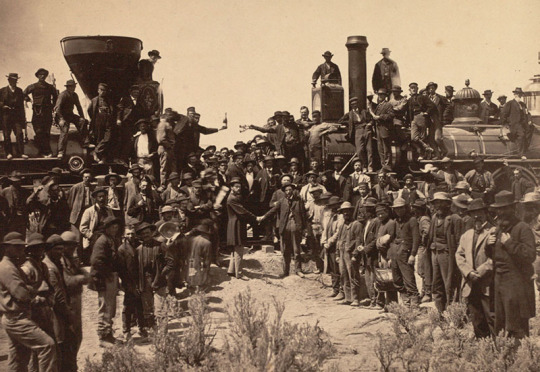
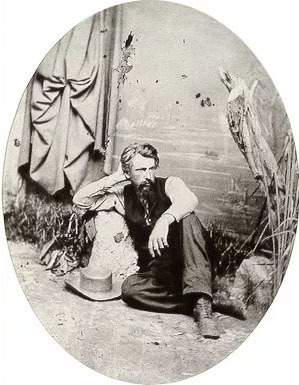






Andrew J. Russell – Scientist of the Day
Andrew Jackson Russell, an American artist and photographer, was born Mar. 20, 1829, in Walpole, New Hampshire, and grew up in Nunda, New York, where he showed early talent as an artist.
read more...
#Andrew J. Russell#photography#American West#railroads#histsci#histSTM#19th century#history of science#Ashworth#Scientist of the Day
38 notes
·
View notes
Text


Early morning mist
I can't remember where I took this. Probably in W.A. near Walpole
#original photographers#nature photography#wildlife photography#bird photography#duck#morning mist#on my travels
68 notes
·
View notes
Text
Leia Organa as the Gothic Heroine
“Through a dream landscape, . . . a girl flees in terror and alone amid crumbling castles, antique dungeons, and ghosts who are never really ghosts.
She nearly escapes her terrible persecutors, who seek her out of lust and greed, but is caught; escapes again and is caught; escapes once more and is caught . . . [and] finally breaks free altogether, and is married to the virtuous lover who has all along worked (and suffered equally with her) to save her."
-Leslie A. Fledler, Love and Death in the American Novel

The gothic novel is a genre of literature that has grown increasingly compelling to me. Defined by its mixture of romanticism and horror— or “wonder and terror”, with a “loose literary aesthetic of fear and haunting”— these stories are known for their forbidden castles, ghostly mysteries, and, most centrally, their heroines, fleeing terrified into the night in a flowing white gown…
Over the years the gothic has become a genre dominated by the feminine and by women writers. And even though the first example of gothic literature, Horace Walpole’s The Castle of Otranto, was written by a man, the story is largely focused on its heroines. The central plot thread sees a corrupt tyrant prince pursuing a much younger princess for the sake of marriage and her desperate attempts to escape him, as she flees through his castle, through twisted corridors, trap doors, and all manner of danger.
I began to think of the relation between the archetype of gothic heroine and Star Wars’s female lead, Princess Leia Organa. After all, she is typically clad all in white and on the run from a dastardly Imperial villain of some sort. And it would not be so difficult for the Death Star to serve as an old manor, filled with secrets and danger… trap doors (garbage chutes), gaping chasms, masked phantoms (Sith Lords) and terrible, power-hungry old men.

The gothic heroine is a young woman often characterized by her virtue, innocence and beauty. She may be born into a position of high social status, with a wealthy or aristocratic family, or even be full-fledged royalty. Some time early in the story, however, she loses her privilege and power… orphaned, imprisoned, or otherwise inconvenienced. In Ann Radcliffe’s The Mysteries of Udolpho, for instance, our protagonist Emily St. Aubert lives an idyllic life with her well-to-do parents, only for both to die and her fortune to be lost in the first act, where she is then given into the power of her aunt and eventually her villainous uncle-by-marriage, Montoni. Leia, too, was a happy and beloved child as the Crown Princess of Alderaan, even with the shadow of the Empire looming overhead… but is captured on a fateful mission for the Rebellion and sees her planet destroyed for her troubles.
And while a gothic heroine may be physically frail she has the mental fortitude and agency to be the one who drives the plot forward. Leia, too, subverts being placed the box of “damsel in distress” with her strong will and her active fierce participation in the rebel cause.
The consistent pattern of “escaping and being caught” is another that Leia follows quite clearly throughout the original trilogy… when we first meet her, she is fleeing from her Imperial pursuers, only to be overpowered and captured. She’s taken aboard the Death Star, endures torture, and gets rescued… only for the next movie to involve yet another game of pursuit between her and Vader where she’s eventually caught yet again at Bespin. After another escape, she opens the subsequent film with an attempt to rescue her (not-so) “virtuous lover” from his prison… and she is made a slave. She escapes with her own ingenuity to rejoin the Rebellion, is nearly defeated in the perilous final battle at Endor, but with the help of her allies, wins the day and all is made right. A typical fairy tale ending.
And then there are her villainous persecutors, of which there are primarily three— Vader, Tarkin, and Jabba.
The gothic heroine is often menaced by a powerful man,?usually bearing misogynistic or patronizing sentiments. He is dark and threatening, yet can also be alluring… and the heroine strives to escape his oppressive power. So too with Leia, as representative of the Rebellion, seeking to destroy the oppression of the Empire.
In short, Star Wars is a very melodramatic, archetypal tale, and Leia’s journey both illuminates and subverts that.
#star wars#leia organa#wilhuff tarkin#darth vader#gothic heroines#villain x heroine#tarkin x leia#willeia#leia and vader#star wars a new hope#terrible analysis by tantive
57 notes
·
View notes
Note
Do i dare to ask?
halfway through the european middle ages, churches shifted from the romanesque style to the new gothic style, which favored pointed windows and high ceilings to let in more light and make the church and god feel more welcoming. centuries later in the 1700s, horace walpole developed a fascination with the ruins of these gothic churches and fashioned his house in an appropriation of it, and wrote the first gothic novel, the castle of otranto. british authors became obsessed with gothic fiction, and its preoccupation with the mysterious and haunting supernatural as societal and familial commentary due to gothic architecture being these dark and decaying places, despite having been light and welcoming at the time they were built. from britain, the genre spread to america, where it flourished as a commentary on the underside of the american dream, first in prose and then on film and then television. twin peaks was the first tv show to lean into the gothic genre, followed by the x files a few years later and then the third to complete this trio at the turn of the century: supernatural. because the gothic leans so heavily upon incest as a symbolic trope, main characters sam and dean exhibit incestuous subtext (stated explicitly in the show by the angel zachariah and outside by series creator eric kripke), leading people to ship both their characters (wincest) and their actors (j2). in 2010, an anonymous request for a "doggy style" alternate universe including "alpha" and "bitch males" was filled by tehdirtiestsock, spawning the a/b/o, or omegaverse, genre of fanfic. slowly this genre also infiltrated the self-published romance genre, where an author sued another for plagiarism based on similar omegaverse tropes, despite the fact that the genre had already been established. the lawsuit was covered by several fandom-focused youtubers.
#sorry i made this extremely comprehensive so it could be understandable to outsiders hahaha#tardis-to-pendragon#letters#gonna paste this on the og post too
29 notes
·
View notes
Text
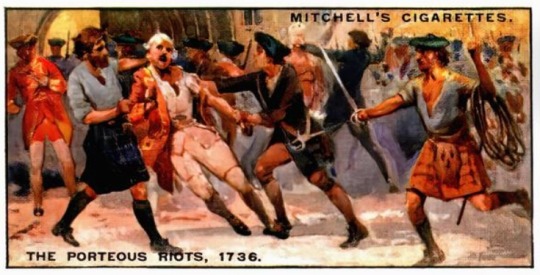
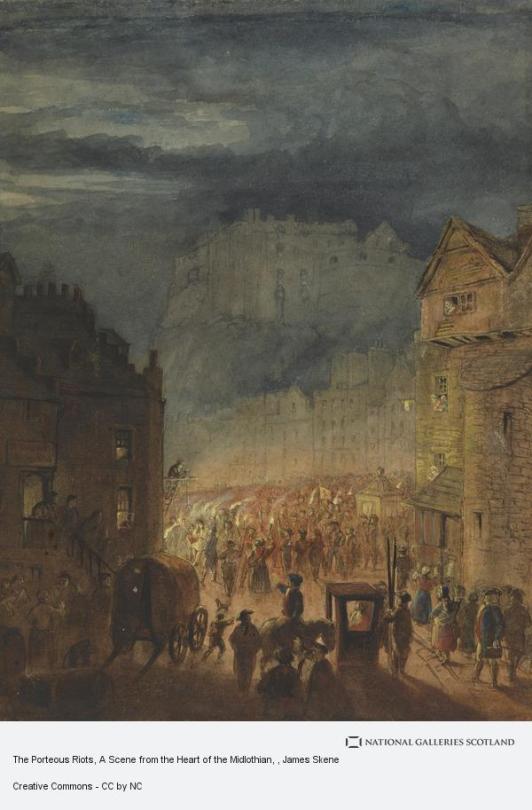


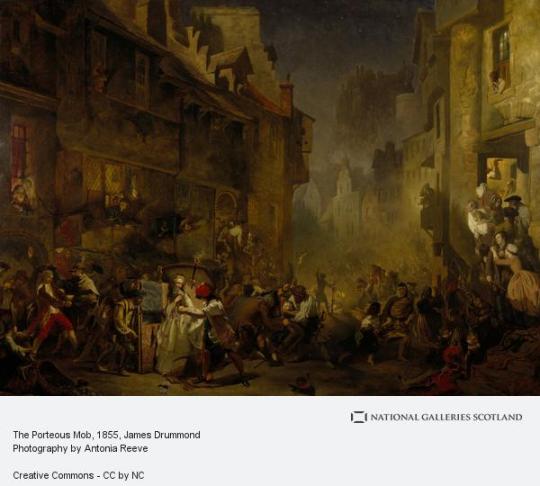
April 14th 1736 saw the Porteous Riots in Edinburgh take place.
The riots that erupted were over the execution of a smuggler called Andrew Wilson. Andrew was one of three who were charged with smuggling and attempting to rob Collector of Excise, James Stark at the Pittenween Inn, Fife
One of the men, William Hall, turned Kings evidence and was exiled from Scotland, which left Wilson and his friend George Robertson, facing the hangman’s noose.
The pair had been locked up in the Tolbooth on the High Street and an attempt at escape had been thwarted after the rather portly Wilson got stuck in a window after managed to saw through some bars.
A few days before sentence was to be carried out, the men were taken to the Kirk to make their peace with the lord and repent for their sins, it was here Wilson caused a distraction and Robertson made off, according to tradition he made it to Holland and ran a Tavern the rest of his days.
There was a feeling of sympathy for Wilson, not just because he was the only one left to face the music, but the populace of Edinburgh, and Scotland as a whole were still smarting at the higher taxes imposed through excise after the act of union, on the day of his hanging a large crowd had gathered and they were a bit unruly to say the least but the execution took place without incident, but the peace didn’t last long. Just as Wilson’s body was being cut down from the gallows, a section of the crowd began pelting the executioner with stones. Rumours had been rife that Wilson had been tortured while incarcerated and what had been a relatively calm sea of spectators quickly transformed into an angry mob.
The city guard fired into the crowd, killing a few and wounding a considerable number of persons. John Porteous, captain of the city guard, who was accused of both shooting and giving the order to fire, was brought to trial in July and sentenced to death.
Events in Scotland alarmed the government in London, and Sir Robert Walpole attempted to influence events by asking his representative in Edinburgh to become involved ordering The Captain be pardoned. He had miscalculated, underestimated the depth of feeling in Scotland.
On the eve of Porteous’ proposed execution, a 4,000 strong mob took to the streets of Edinburgh. A total lockdown was ordered by the City Guard and all gates, including the Netherbow Port were closed – shutting out many troops stationed outside of the town. The enraged mob made their way to the Tolbooth Prison where Porteous was being held and set the jail door alight. Porteous attempted to flee but was eventually grabbed by force and dragged up the Lawnmarket, then down along the West Bow towards the Grassmarket where Andrew Wilson had met his end. Porteous was strung up on a dyer’s pole and brutally lynched until he ceased to move. The government would later declare a reward of £200 for any information of those responsible for Captain Porteous’ murder, but none of those guilty would ever be found. Sir Walter Scott’s famous novel The Heart of Midlothian written in 1818 would later recall the events in great detail.
On the Grassmarket just past Armstrong’s Vintage shop you will see the plaque commemorating Porteous, and to your right heading east you can enter Greyfriars Kirkyard and visit his grave, as seen in pics two and three.
21 notes
·
View notes
Text
THIS DAY IN GAY HISTORY
based on: The White Crane Institute's 'Gay Wisdom', Gay Birthdays, Gay For Today, Famous GLBT, glbt-Gay Encylopedia, Today in Gay History, Wikipedia, and more …
September 24



1482 – Switzerland: Richard Puller von Hohenberg is burned at the stake along with his servant Anton Matzler in Zurich. They are accused of having a homosexual relationship.


1717 – Horatio Walpole, 4th Earl of Orford, aka Horace Walpole (d.1797), was a politician, writer, architectural innovator and namesake of his cousin Horatio Nelson.
He was born in London, the youngest son of British Prime Minister Robert Walpole. He was educated at Eton College and King's College, Cambridge. His homosexuality revealed itself early, and he is believed to have had affairs with the poet Thomas Gray, and with Henry Fiennes Clinton, 9th Earl of Lincoln (later 2nd Duke of Newcastle). Gray accompanied Walpole on the Grand Tour, but they quarrelled, and Walpole returned to England in 1741 and entered parliament. He was never politically ambitious, but remained an MP even after the death of his father in 1745 left him a man of independent means.
Following his father's politics, he was a devotee of King George II and Queen Caroline, siding with them against their son, Frederick, Prince of Wales, about whom Walpole wrote spitefully in his memoirs.
Walpole's home, Strawberry Hill, near Twickenham, was a fanciful concoction of neo-Gothic which began a new architectural trend. In 1764, he published his Gothic novel, The Castle of Otranto, setting a literary trend to go with the architecture. Strawberry Hill is undergoing a major restoration project.
From 1762 on, he published his Anecdotes of Painting in England. His memoirs of the Georgian social and political scene, though heavily biased, are a useful primary source for historians. In one of the numerous letters, from January 28, 1754, he coined the word serendipity which he said was derived from a 'silly fairy tale' he had read, The Three Princes of Serendip. He also authored the often-quoted epigram, 'Life is a comedy to those who think and a tragedy to those who feel'.
Walpole spent most of his life hopelessly in love with his heterosexual friend, Henry Seymour Conway, to whom he addressed beautiful love letters. Ironically, when he died, he left Strawberry Hill to Conway's daughter, Mrs. Anne Seymour Damer, without ever having known that she was one of the most celebrated Lesbians of the 18th century.
When Horace Walpole died without a male heir in 1797 the title Earl of Orford became extinct.


1899 – William Dobell (d.1970) is regarded by many as one of Australia's greatest portrait painters. After a modest beginning to his artistic career, Dobell achieved legendary status in Australian art history with his controversial receipt of the 1944 Archibald prize, Australia's premier award for portraiture. While Dobell's oeuvre is replete with homosexual subtexts, the artist spent his life hiding his sexuality from what was then a very conservative Sydney society, wary of the potential harm to his career that an open display of homosexuality could cause.
Born in New South Wales on September 24, 1899, Dobell grew up in a large family in a working class suburb of Newcastle, two hours north of Sydney. As an adolescent he spent much of his time in pursuit of art, rather than young women. At the age of fourteen, he left Cooks Hill School, where art training was limited, to pursue a freehand drawing course at a local technical college. After taking up an apprenticeship with an architect in Newcastle, Dobell went to Sydney in 1924, where he worked as a draftsman and attended evening art classes at Julian Ashton's Sydney Art School.
Dobell's winning of the Society of Artists Travelling Scholarship in 1929 allowed him to further his training at the Slade School of Art in London. Dobell used London as a base from which he travelled to museums in Holland, Belgium, and Paris.
Many of Dobell's most important life studies of the male nude, including Study, Boy on Beach (1933), were produced at this time, and suggest Dobell's delight in the physicality and sexuality of his male models.
On returning to Sydney in 1939 the still relatively unknown Dobell taught at East Sydney Technical College. With the outbreak of war, he took up a position with the Civil Construction Corps, becoming an unofficial war artist. It was during this time that Dobell produced some of his most famous portraits. These include The Cypriot (1940), The Strapper (1941), and The Billy Boy (1943), the latter providing one of Dobell's most iconic references to homosexuality. The painting depicts the weighty torso of laborer Joseph Westcott, his flabby, pink flesh barely covered by a diaphanous, loose, white singlet.

The Billy Boy
In other paintings produced during the war, such as Emergency Loading at Night, Perth (1944), Barrowman, Perth (1944), and Concrete Consolidation Workers, Sydney Graving Dock (1944), Dobell also idealized the masculinity of fellow Construction Corps workers. His paintings glorify the men's physical prowess, casting them as sexualized, heroic workers.
Dobell's receipt of the 1944 Archibald Prize for his Portrait of Joshua Smith made him an Australian household name. Even mainstream society, ordinarily uninterested in the politics of Australia's small artistic community, was intrigued by the often viciously personal debate initiated by the awarding of the prize to Dobell.

Portrait of Joshua Smith
The incident was also noteworthy because beneath a thin veneer of high-minded aesthetic discussion lurked a voyeuristic curiosity about the true nature of the relationship between Dobell and his sitter, Joshua Smith, a friend and fellow artist.
Traumatized by the intense public scrutiny of his personal life, in late 1944 Dobell retreated to the relative isolation of Wangi Wangi on the New South Wales central coast. He won the Archibald Prize two more times.

Self-portrait
He was knighted in 1966, but died four years later on May 13, 1970. In accordance with the artist's wishes, much of his estate was used to establish The Sir William Dobell Foundation, an institution that continues to benefit and promote art in New South Wales.


1961 – John Logan is an American playwright, screenwriter, and film producer. He is openly gay.
Logan was a successful playwright in Chicago for many years before turning to screenwriting. His first play, Never the Sinner, tells the story of the infamous Leopold and Loeb case. Subsequent plays include Hauptmann, about the Lindbergh baby kidnapping, and Riverview, a musical melodrama set at Chicago's famed amusement park.
His play Red, about artist Mark Rothko, was produced on Broadway, where it received six Tony Awards in mid-June, 2010, the most of any play.
Logan wrote Any Given Sunday and the television movie RKO 281, before gaining an Academy Award nomination for co-writing the Best Picture-winner, Gladiator in 2000. He gained another nomination for writing 2004's The Aviator, starring Leonardo DiCaprio and directed by Martin Scorsese. Other notable films written by Logan include Star Trek: Nemesis, The Time Machine, The Last Samurai, and the Tim Burton-directed musical, Sweeney Todd: The Demon Barber of Fleet Street, for which he received a Golden Globe Award.
Logan's most recent feature films include Rango, an animated feature starring Johnny Depp, the film adaptation of Shakespeare's Coriolanus directed by and starring Ralph Fiennes, and the film adaptation of The Invention of Hugo Cabret directed by Martin Scorsese. Logan wrote the script to the James Bond film, Skyfall, along with Neal Purvis and Robert Wade. He also wrote the next Bond film, Spectre (2015).


1992 – The Kentucky Supreme Court strikes down the state's same-sex-only sodomy law both as an invasion of privacy and a denial of equal protection of the laws.


1993 – Ben Platt is an American actor, singer, and songwriter. He began his acting career in musical theater as a child and appeared in productions of The Sound of Music (2006) and The Book of Mormon (2012–2015), rising to prominence for originating the title role in Broadway coming-of-age musical Dear Evan Hansen (2015–2017). His performance in the latter earned him multiple accolades, including a Tony, Emmy, and Grammy Award. At 23, Platt became the youngest solo recipient of the Tony Award for Best Actor in a Leading Role in a Musical. Platt reprised the role of Evan Hansen in the 2021 film adaptation of the musical.
Platt's film credits include the Pitch Perfect film series, Ricki and the Flash (2015), and Run This Town (2019). Since 2019, he has starred in the Netflix comedy-drama series The Politician, for which he was nominated for the Golden Globe Award for Best Actor – Television Series Musical or Comedy.
In 2017, Platt was included on the annual Time 100 list of the most influential people in the world. Platt signed with Atlantic Records in 2017 and released his debut studio album, Sing to Me Instead, in March 2019. In May 2020, a concert film, titled Ben Platt Live from Radio City Music Hall, debuted on Netflix. Platt's second studio album, Reverie, was released on August 13, 2021.
Platt was born in Los Angeles, the fourth of five children of Julie and Marc Platt. His father is a film, television, and theater producer whose credits include Legally Blonde, Into the Woods, La La Land, Mary Poppins Returns, and the musical Wicked. He and his family are Jewish.
He attended the Adderley School for Performing Arts in Pacific Palisades, performing in productions like Bye Bye Birdie and Into the Woods. Platt attended Harvard-Westlake School in Los Angeles, graduating in 2011. He then enrolled at Columbia University in New York but dropped out after seven weeks to fulfill his contract with The Book of Mormon.
Platt is gay; he told his family when he was thirteen years old, and publicly came out in 2019, before the release of his song "Ease My Mind". On January 12, 2020, Platt began dating Noah Galvin (who replaced him in the titular role in Dear Evan Hansen). On November 15, 2020, he revealed that back in March of that year, he tested positive for and eventually fully recovered from COVID-19.


Waawaate Fobister (b.1984) is a Canadian playwright and actor, whose debut work Agokwe won six Dora Mavor Moore Awards in 2009. The play, which premiered at Toronto's Buddies in Bad Times theatre in 2008, is a gay-themed play which explores the burgeoning attraction between two aboriginal teenagers, one a traditional Ojibwe dancer and the other a hockey player.
Fobister's solo, multi-character debut play focuses on the attraction between the two vastly different Aboriginal teens. Jake is a lively and animated grass dancer from one reserve, while Mike is an emotionally distant star hockey player from another. The two have eyed each other before, but it's only during one momentous hockey tournament weekend in Kenora that the secret spark they once shared begins to ignite — with disturbing results.
Fobister played all of characters in the Buddies production, including both teenagers.
An Anishinaabe from the Grassy Narrows First Nation north of Kenora, Ontario, Fobister identifies as gay or two-spirited. Agokwe, the title of his debut play, means "two-spirited" in the Anishinaabe language.Fobister says it was important to him to share his experience of growing up queer in the isolated Grassy Narrows reserve. "I wanted to touch on the homophobia that exists because I've personally experienced gaybashing on my rez, by another native guy," he says. "They beat me up, and put me in the hospital for three days. There were other times — just in Kenora I got attacked by some white people calling me 'Faggot, faggot, faggot,' and then they punched me."


7 notes
·
View notes
Photo

Horatio Gates
Horatio Gates (1727-1806) was an English-born general of the Continental Army during the American Revolutionary War (1775-1783). Initially viewed as a hero for his stunning victory at the Battles of Saratoga, Gates' reputation was later tarnished by both his involvement in the Conway Cabal to replace George Washington as army commander, and his catastrophic defeat at the Battle of Camden.
Early Life & British Service
Horatio Gates was born on 26 July 1727 in Maldon, Essex County, England. He was likely the son of working-class parents Robert and Dorothea Gates; his mother, a housekeeper for the Duke of Bolton, was able to use her position to secure opportunities for her family that otherwise would have been out of reach. For instance, through her friendship with the waiting-maid of the Walpole family, Dorothea Gates managed to get future English writer and politician Horace Walpole (who was 11 years old at the time) to be the godfather of her son. In 1745, 18-year-old Horatio Gates was able to purchase a commission as an ensign in the British Army, largely thanks to the influence of the Duke of Bolton.
The young Ensign Gates has been described by biographers in unflattering terms; one characterized him as a "little ruddy-faced Englishman peering through his thick spectacles" and a "snob of the first water" (quoted in Boatner, 412). He first served with the 20th Regiment of Foot in Germany during the War of Austrian Succession (1740-1748) before volunteering to travel to Halifax, Nova Scotia, to serve under its governor, Edward Cornwallis; Cornwallis was not only an early mentor to Gates but also the uncle of Lord Charles Cornwallis, who would one day face Gates on the battlefield. Promoted to the rank of captain in the 45th Regiment of Foot, Gates saw action against the Mi'kmaq and Acadians in Canada. In 1754, he married Elizabeth Philips, daughter of a Nova Scotia councilman, with whom he would have one son, Robert (b. 1758).
In 1755, as the French and Indian War (1754-1763) was escalating in North America, British General Edward Braddock was sent to lead an expedition to capture the French-held Fort Duquesne and thereby assert British control of the Ohio River Valley. Gates traveled to Fort Cumberland, Maryland, to join the expedition, where he would have met several other men who would one day also play key roles in the American Revolution including Daniel Morgan, Thomas Gage, Charles Lee, and, of course, Lt. Colonel George Washington of the Virginia militia. Braddock's Expedition set out on 29 May 1755 and made it to the Monongahela River a little over a month later, where it was ambushed by French troops and their Indigenous allies. General Braddock was killed in the ambush, and a large portion of his army became casualties including Gates, who was wounded. The survivors retreated to friendly territory.
After the Battle of the Monongahela, Gates was mainly relegated to positions of military administration, something at which he proved exceptionally talented. He served as chief-of-staff first to Brigadier General John Stanwix and then to Stanwix's replacement, Robert Monckton. In 1762, Gates accompanied Monckton in the capture of Martinique. Although Gates did not experience much combat during the expedition, he was nevertheless tasked with bringing news of the victory to England and was rewarded with a promotion to the rank of major. The war ended the following year and Gates returned to England, only to realize he had little future in the British Army; the limitations put on him by his social status meant that he could not advance much further in the military than he already had. Frustrated, Gates sold his major's commission in 1769 and, with assistance from his old army comrade George Washington, moved to Virginia with his family. Gates purchased Traveler's Rest, a Berkeley County plantation next door to Washington's younger brother, Samuel. As Gates began his new life as a Virginian planter, he also purchased several enslaved people to labor in his fields.
Continue reading...
14 notes
·
View notes
Text
Why Do They Talk Like That: a stream of consciousness
Fantasy linguistics are so hard like where do you draw the line... I mean none of my characters are referencing major theistic religions or using real life loanwords or expletives but then there's quote-unquote fun stuff like "sadism" or "lunatic" or "sinister". i.e the Marquis de Sade does not exist in this world, but the concept of pleasure from cruelty does... Latin is not a language there, but I, personally, am writing in English, which has much of its etymology rooted in Latin (as well as pretty much every other language ever), even if there is no hate for left-handed people or indeed the left in this world, so "sinister" is inexplicable in itself now (odd how the left has historically been demonised and that it's also the socialist side of the political spectrum. not that odd really. thank you robert walpole?). The same with "lunatic": the moon is literally worshipped in some areas of my world, but it's still a term characters use, despite the moon having positive connotations.
Where Do You Draw The Line... I can't write in a conlang because a) I am not masochistic but b) I want my work to actually be read. You can imply different languages with accents and word choice and compound words, but ultimately I am writing in the same language for all (despite being bilingual, go me!) and ultimately that language is one that exists only in our world and not in the one that I've created.
While we're here, let's talk about swearing (cursing if you're american?) in fantasy settings. I don't mean "oh my god/s", that's arguably blasphemy and certainly not explicit; I don't mean "bloody" (not really explicit either) because frankly that does tend to fit a fantasy vibe with the type of characters likely to use it (considering the real world stereotypes and thus the archetypes an author will write using it). I mean expletives like "fuck", "bitch", "shit": STOP USING THEM. you absolute buffoons.
Recently I read a fantasy novel which included a whole magic system and several countries with absolute monarchies, etc, and they kept using expletives and it just did not work, and it never does. A step back: I believe that using expletives when writing in a real world setting (provided it's period-believable, of course) can work, and often (not always, not even mostly) works - I do it myself. However, believable expletives and exclamations and intensifiers can and sometimes do make or break worldbuilding, at least for me. The worldbuilding in the novel was fine, good even! But every time the (twenty-eight-year-old) mc used "fucking" or "bitch", I was immediately yanked out of the story and into reality. It was like reading a period piece (say, in the 19th-early 20th century) and seeing "bitch" in the expletive (slur) sense. I don't care whether it would be used: I don't BELIEVE that it would be.
Suspension of disbelief is everything, which (as a theatre kid...) is, I suspect, why musical films don't work: we're primed for a more true-to-life piece, whereas in a theatre, we're prepared to cast a lot more aside. We KNOW they're actors, we know bursting into song is unrealistic, but it's the stage! We believe it anyway. Seeing a fantasy character, particularly one that was meant to be a minor royal, consistently THINK in expletives (and not just exclaim them!) felt to me like watching Mean Girls The Musical The Movie. I did not believe the magic (which was a major plot point so it kind of sucked). I did not believe that the characters saying "bitch" and "fuck" would say those words, especially since those characters were almost exclusively limited to the middle-aged queen, an almost thirty-year-old established to be groomed into mild-mannered obedience, the former queen's guard and a (bastard) prince. I did not believe that the characters whose thoughts I was reading would think them, and thus I did not believe in the story.
If you're going to create a prose-based world intended to be separate from our own in terms of religion/history/sociopolitical structure/magic/etc, you NEED to think about the linguistics. I'm not saying think HARD or be super mega creative: in my sky-worship country, a common exclamation is "stars-be", short for "stars-be-dimmed", ditto "skies-be" and "skies-be-felled". My sun-based little sillies go "be-set" as in "sun-be-set"; the only country in a technological revolution (also the only country with guns): "I'm not wired that way"; "he's gearing for a fight"; "I was shooting for you". Furthermore, when explaining their culture in other languages, they struggle for words, because, for example, a train is a monolingual concept (one falters when about to describe someone as a "train wreck" and just goes "sorry"). It's not clever, it's not particularly original, but, in my opinion, it makes the language, and by extension the world, more believable.
While I'm mid-rant: there's a marked difference between characters of different class and upbringing. My more religious, self-righteous queen of skycountry says "my stars": she rules the country, she is a little crazy insane, she feels that she owns the sky, too. A less-educated character uses slang like "lunar", "feared", "heartfulness" where his posh boy counterpart says "insane", "afraid" and "empathy". And yes, I am totally neurodivergent, and I think about details, and I also study the development of the English language and want to continue to do so at university, so of course I am more drawn to it, but at the end of the day if you're writing prose then the words are really bloody important.
TLDR: worldbuilding is hard; do your high fantasy (or even low fantasy) characters NEED to say "fuck"?
#writing#ocs#worldbuilding#fantasy writing#fantasy worldbuilding#linguistics#or just me being autistic#ven talks about sociolinguistics#surprisingly for the first time#creative writing#writing advice#rant#yeah this is just a rant#the book was kill the queen btw#and it was good despite the fact that being clean would honestly have improved it#this is going to be so valuable when i'm rich and famous#got the capital letters out for this
7 notes
·
View notes
Text
true history: true mystery, chapter 1085 spoilers
OH MY GAWD,
What a chapter. And cos he's my boy, told you we didn't have to worry too much about one

Trafalgar
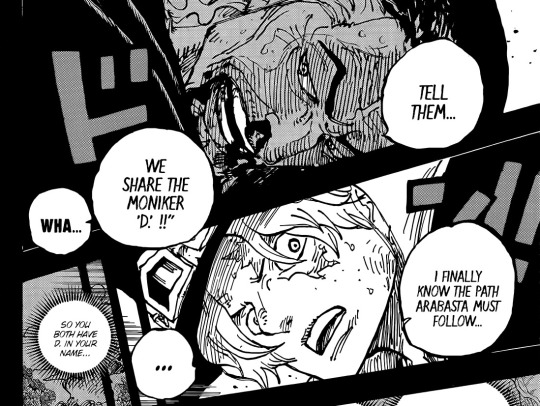
D.
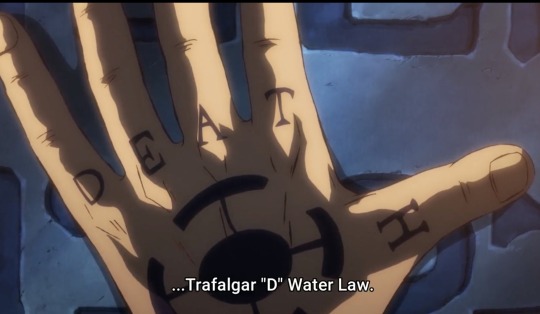
Water Law!
I'm so excited (I feel like I should go out and order the whole set of steak knives).
Anyhoo! I remember when I enjoyed reading the scans on my Friday, and they now come out very early my Thursday morning (like, super early. It's just shy of 3am). BUT this was a treat. And the reason I mostly read them is to prevent being spoiled, but also because they include really interesting translator's notes, etc. such as the ones below about Imu:
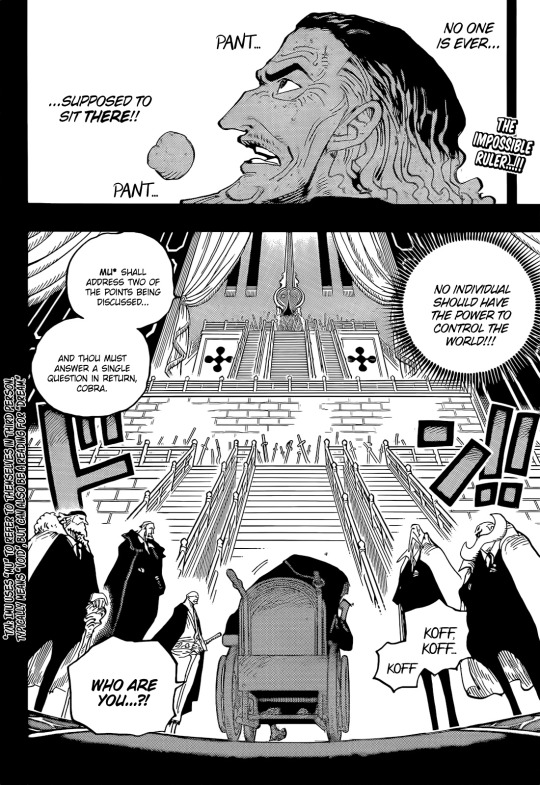
Which is difficult to see, but basically it says that Imu refers to themself as Mu and then says that Mu can refer to the void century but also to dreams. Super interesting. And so, Lili was not, unfortunately Imu (but that's okay, cos' I love this story line too), BUT she was a...

D!!!
As shown above, where King Cobra realises...
...that he won't survive his encounter with Imu (who was apparently one of the original 20), and Cobra reveals that Lili was Queen Nefertari D. Lili. GOOD STUFF. Sabo overhears. Imu has some problems with this, because, as stated by Cora
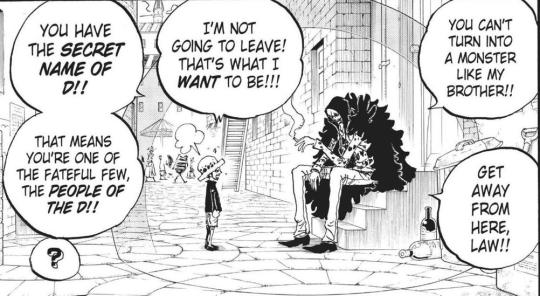
and reiterated by (without knowledge to the best of our understanding) Imu

the "D" is the moniker of the Celestials ancient enemy.
And, although sketchy, look at the perspective from that panel above! Imu is miles above them all. Another aside, while looking up Cora and Doflamingo stuff, there's also the 'heavenly' perspective on this frame with Cora and Law, but I also know Oda is fond of this type of editing/story telling:

Back to 1085: Cobra's recollection that Imu was the name of one of the original 20 does tie into the probable theory that Imu had the eternal youth operation centuries prior.
Anyhoo, this is well out of order (my posting of frames) as always! Sorry. It's not only the D's that Imu and their clan need to be scared of, but also
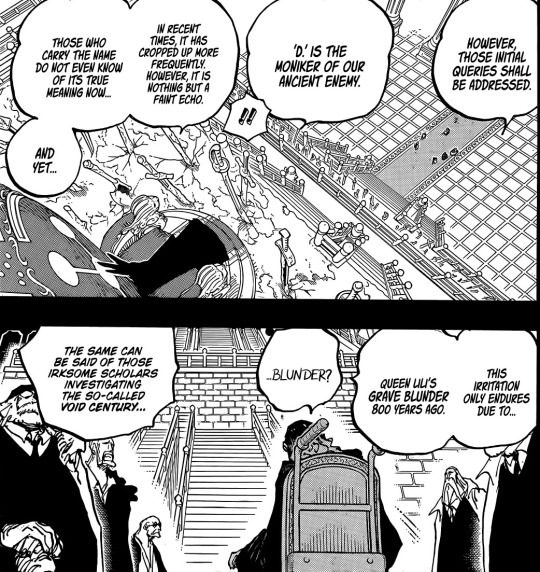
the scholars. Be still my LawBin shipping (platonic or romantic) heart! But, I digress. So Lili is the one responsible for the preservation and also dispersal of
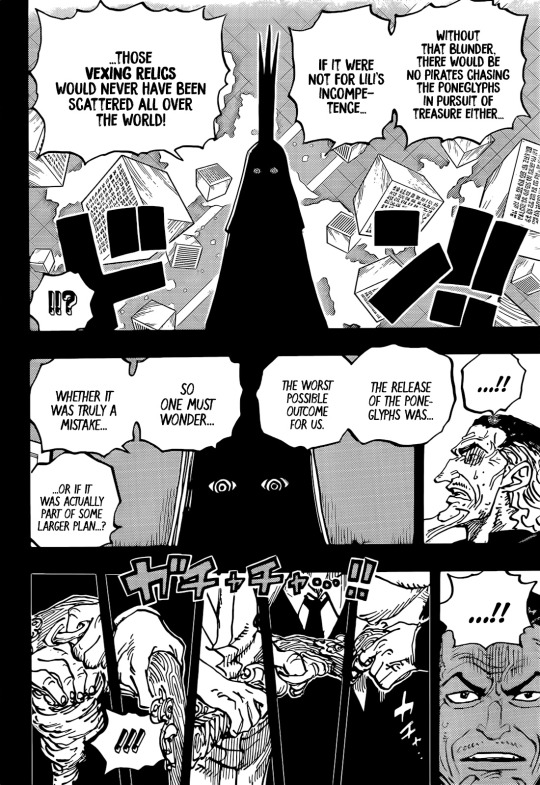
the poneglyphs. Whole page there. So much information! Cobra has not revealed that Lili was a "D" at this point, or that he himself is, so he was playing with fire coming in to see the Elders, but I guess the whole lineage had known about that for a long time then (that they had the initial for some reason) and had survived. It also seems that maybe King Cobra did know more about the poneglyph in Alabasta than previously assumed. Perhaps?
Anyway, Imu above says that Lili's dispersal of the poneglyphs around the world was perhaps a deliberate action (apparently it had been passed off as a mistake, a blunder) as part of a larger plan. And with the reveal of her being a possessor of the Will of D. it seems it probably was, even if she was a catalyst, as so many D's seem to be, without having full awareness or knowledge of what ultimate role they're playing.

Full page again, cos it's so good. So Imu questions Cobra as to why they never divulged Lili's full name, only referring to her by her royal title, which is actually pretty standard practice. BUT, Imu obviously has very strong convictions that Lili is one of those rabble rousers who get this his entity-self really hot under the collar too!
And the Gorosei basically saying: You can't expose that we're some kind of oligarchy/dictatorship/absolute malignant monarchy when it's supposed to be some kind form of supposed League of Nations acting for all countries and supposed world peace. Interesting mix of Imperialism and colonialism these guys have going on. Anyway! The revery is still going on, and is now absolutely proven to be a farce:
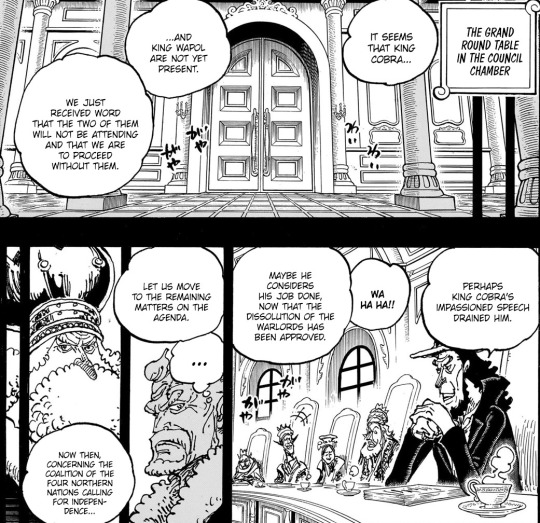
Although King Neptune, and who's the other dude? Can't remember. Not Dalton, is it? (please let me know) King Riku Doldo are looking very skeptical at the Uncle Sam dude. (Thank you @robinchan-hananomi !)
Walpol becomes relevant in a way that it seems that Caribou will be too, and Vivi has been kidnapped by the CIA CP0 (or are they CP9)?
Walpol overhears and sees not only Imu's decimation of Cobra with figures that look a lot like Kanjurou's Kazenbo flame spirit from Wano (did the Gorosei shape-shift too, or was it all Imu sending out some kind of malevolent spirit?), but I think he also overhears Cobra's revelation to Sabo that has a nice SFX bubble over it to just tease we readers enough with hints of information about how the Poneglyphs must be protected, and will seemingly will help usher in the dawn! Ooh, so excited.
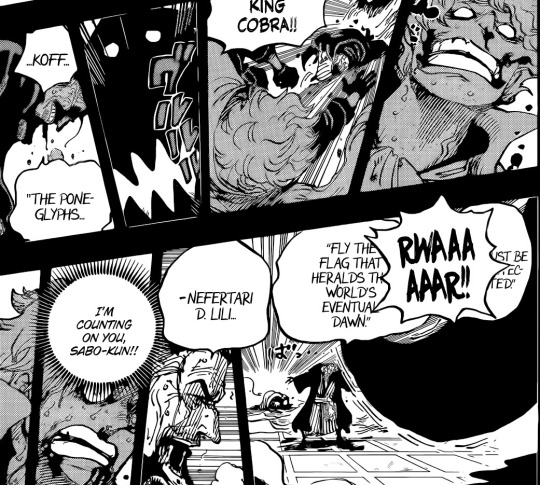
BTW. What or who is the figure behind Cobra in the bottom right panel? Sabo?
Walpol outs himself as having seen everything, so shocking is it to him:
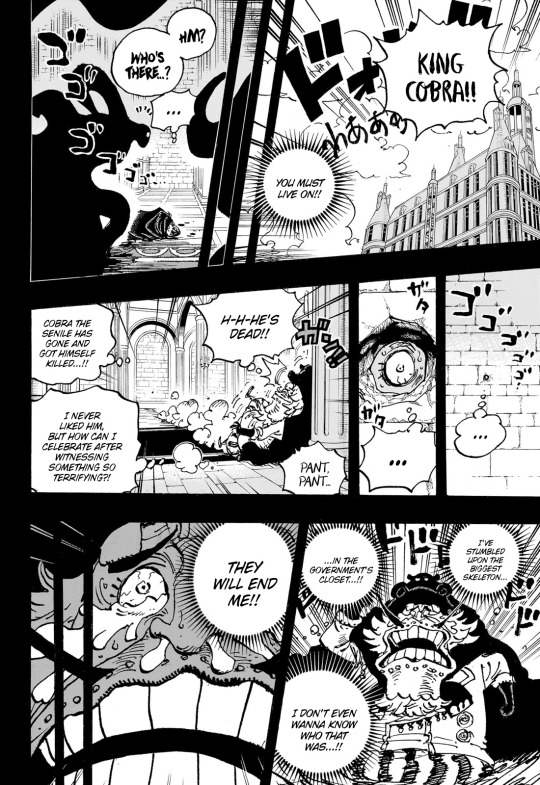
and so the spectres are on his tail (and I think it's quite funny that first Imu doesn't know or sense Sabo, and other defenses are breached by Walpol, of all people!). SO, he's one of my least favourite villains, along with Caribou and Spandam, but I'm guessing there's something with their devil fruits that make them crucial to the plot, as well as being kind of incidental characters witnessing key points of One Piece lore.
I doubt he has any great love for Vivi, but he also probably knows where his best chance for survival lies, so, it seems he's been creeping around the castle and I'm going to align CPO with Get Smart now, cos they've got that kinda vibe. Not goofy enough to be Scooby Doo (although Jabra does a good job), but still funny and sexy enough to be the characters of Get Smart who weren't Max. (look it up if you don't know).
Anyhoo! Vivi got kidnapped, and I'm guessing it was at the urging of the gorosei who did it at the urging of Imu, or maybe if Cobra didn't spill the beans, they would've used her as a bargaining chip. Anyway, Kalifa here:

stating that Vivi will end up being a pet (?!?). Did Charloss want her? And I'm wondering if Jabra's wording is a mistranslation, although maybe not. As far as I'm aware, the expression is "play your cards closer to your chest", but maybe it's changed over time. Or there's a pun I'm not getting.
Vivi's reaction in the following frame is awesome (gonna put the whole page in again, cos it's got so much info):

First, awesome that Shirahoshi got away, and we saw that way back when with Garp accompanying the family back to Fishmen Island. Cool info dump from Jabra above. (Very chatty secret agents. Maybe that's why they don't get to wear masks). But I especially like Vivi's incredulity at Kalifa's comment, and her commitment to doing something about it. She's got a devil fruit, doesn't she? Yes! BUT
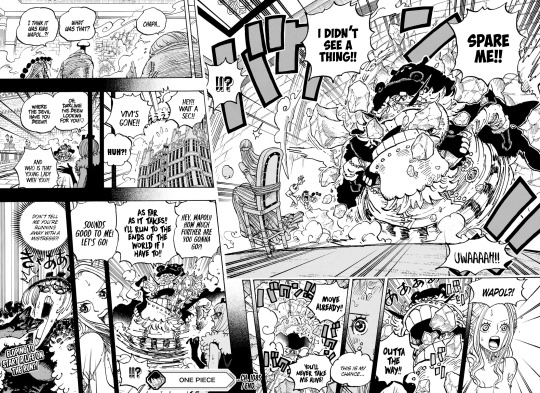
Trashing young prince to the rescue! (okay, he's a king, once disposed, newly reinstated somewhere) (but he is young. This guy's in his 20s, I think). Vivi hitches a ride with the dumpster on wheels. And from there, Big News Morgans picks them up! (not yet witnessed). Here from chapter 1074:

She's really gone up in my estimation. I never noticed how much she speaks her mind and sticks up for others before (I'm slow, don't worry). And it's not just cos she's a D. Haha. That's not an automatic "like" card, but I might be a little predisposed.
Speaking of which, this part with the ASL brothers was hilarious:

"Do want a "D" in your name, Sabo?"
"You can be Sad. Bo!"
"Why'd you put it there!?!"
Ah, lol, bless.
Also, Imu has the same kind of imperiousness as Doflamingo. Doflamingo's rougher in speech, and I'm guessing with the "thou" and so on shown in the scanlation on the first page that Imu is formal, but as entitled and condescending as fuck, just like our pink feathered friend.
One thing (or many) so interesting about Doffy, though, is:
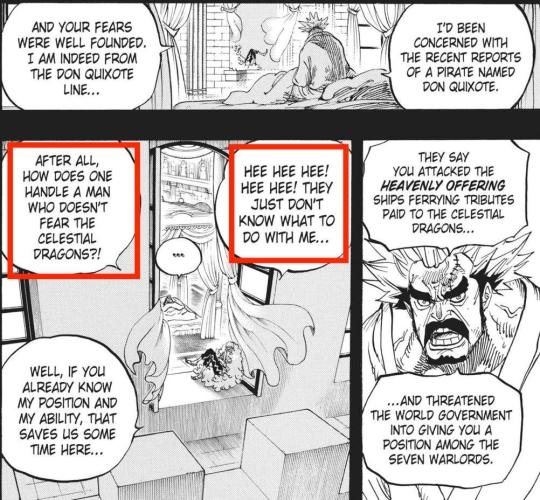
from chapter 727, is that he's a man very sore about losing his Celestial dragon status, who wants to destroy them and the world government, and who is not afraid of the CD's. Also, it seems that he's well aware of Imu (Mary Geoise's greatest treasure?). I wonder how he was going to challenge Imu if Law had granted him eternal life. If that was his aim. So, a digression, but I think our pink bird will again be relevant soon! Fingers crossed, and I really don't want them to redeem him. Please.
Lastly, the cover was very cute:

Franky directing newly hatched turtles to the ocean, and it's true, so many head in the wrong direction, and such a small proportion actually survive, so he's a hero. Is he sitting on a turtle-hatchling eating crab?
Dunno if any of this was coherent, and I'm sure I missed a bunch, but over and out for now (ah, back to bed!).
#one piece#chapter 1085#king cobra#imu one piece#will of d#poneglyphs one piece#poneglyphs#nefertari vivi#walpol one piece#one piece spoilers#opspoilers#op spoilers#chapter 1085 spoilers#long post#chromanga#chromacaps#chromalami#chromameta
115 notes
·
View notes